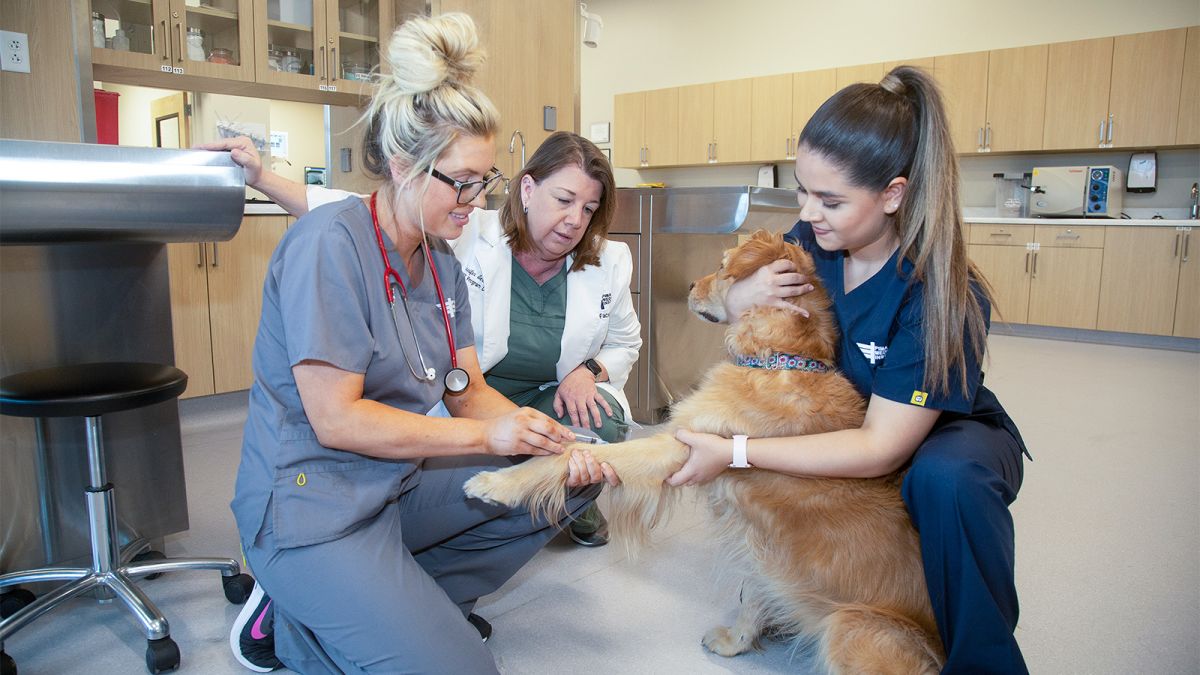

Education
How To Become A Vet Tech
Published: February 24, 2024
Learn about the education required to become a vet tech and start your journey towards a rewarding career in animal healthcare. Discover the steps and qualifications needed to pursue this fulfilling profession.
(Many of the links in this article redirect to a specific reviewed product. Your purchase of these products through affiliate links helps to generate commission for Noodls.com, at no extra cost. Learn more)
Table of Contents
Introduction
Becoming a veterinary technician, commonly referred to as a vet tech, is an incredibly rewarding career path for individuals who have a passion for animal welfare and healthcare. Vet techs play a crucial role in the veterinary field, providing essential support to veterinarians in caring for animals and ensuring their well-being. This profession offers a unique blend of medical knowledge, technical skills, and compassion for animals, making it an ideal choice for those who seek a fulfilling and impactful career.
As a vet tech, you will have the opportunity to work closely with a diverse range of animals, including dogs, cats, exotic pets, and even wildlife. Your responsibilities may encompass assisting in surgical procedures, conducting laboratory tests, administering medications, and providing nursing care to animals in need. Additionally, you will have the chance to educate pet owners on proper animal care and contribute to the overall health and happiness of beloved pets.
The journey to becoming a vet tech begins with a strong foundation in education and training. Pursuing a formal education in veterinary technology is essential for acquiring the knowledge and skills required to excel in this field. Furthermore, obtaining certification and licensing demonstrates your commitment to professionalism and competence, setting you apart as a qualified and reputable vet tech.
In this comprehensive guide, we will delve into the various aspects of becoming a vet tech, including the educational requirements, certification processes, job duties, essential skills, job outlook, and salary prospects. By gaining insights into these key areas, you will be well-equipped to embark on this fulfilling career path and make a positive impact on the lives of animals and their human companions. Let's explore the exciting world of veterinary technology and uncover the steps to becoming a successful and compassionate vet tech.
Read more: How To Become A Mermaid
Education and Training
Becoming a proficient veterinary technician requires a solid educational foundation and specialized training to effectively care for animals and support veterinarians in clinical settings. Aspiring vet techs typically pursue an associate degree in veterinary technology from an accredited program, which provides comprehensive instruction in animal anatomy, physiology, pharmacology, and medical procedures. These programs are designed to equip students with the knowledge and practical skills necessary to excel in the veterinary field.
The coursework in a veterinary technology program covers a wide range of subjects, including animal nursing, anesthesia, radiology, laboratory procedures, and surgical assistance. Students also gain hands-on experience through internships or clinical rotations, where they work alongside experienced veterinary professionals in real-world veterinary practices or animal hospitals. This practical exposure allows students to apply their theoretical knowledge in a clinical setting, honing their technical abilities and developing a deep understanding of animal care.
In addition to academic studies, veterinary technology programs emphasize the importance of ethical and compassionate treatment of animals. Students learn about animal behavior, welfare, and client communication, preparing them to interact with pet owners and provide empathetic care to animals in various states of health. This holistic approach to education ensures that future vet techs are not only skilled in medical procedures but also possess the empathy and professionalism required to excel in their roles.
Furthermore, some aspiring vet techs may choose to pursue a bachelor's degree in veterinary technology or a related field to further enhance their knowledge and career prospects. A bachelor's degree program provides a more in-depth exploration of veterinary science, advanced medical techniques, and management skills, offering a broader educational experience for those seeking a comprehensive understanding of veterinary medicine.
Upon successful completion of their education and training, aspiring vet techs are well-prepared to enter the workforce with a solid foundation in veterinary medicine and the practical skills needed to provide exceptional care to animals. The combination of academic knowledge, hands-on training, and a compassionate approach to animal care sets the stage for a fulfilling and impactful career as a veterinary technician.
Certification and Licensing
Becoming a certified and licensed veterinary technician is a crucial step in establishing professional credibility and demonstrating competency in the field. Upon completing a veterinary technology program, individuals are eligible to pursue certification through the American Association of Veterinary State Boards (AAVSB) and the Veterinary Technician National Examination (VTNE). The VTNE is a comprehensive exam that assesses the candidate's knowledge and understanding of veterinary technology, covering areas such as pharmacology, surgical preparation, laboratory procedures, and animal care protocols.
Successfully passing the VTNE is a significant achievement, as it signifies that the individual has met the national standards for veterinary technology proficiency. This certification not only validates the vet tech's expertise but also enhances their employment opportunities and earning potential. Additionally, some states may require vet techs to pass a state-specific exam or fulfill additional licensing requirements to practice within their jurisdiction.
Obtaining state licensure is essential for vet techs to legally practice in a clinical setting and perform a wide range of medical tasks under the supervision of a licensed veterinarian. Licensure ensures that vet techs adhere to professional standards and regulations, promoting the highest level of care and safety for animals. It also provides a framework for accountability and ethical conduct, safeguarding the well-being of the animals under their care.
Continuing education is often a requirement for maintaining certification and licensure as a vet tech. This ongoing commitment to learning and professional development ensures that vet techs stay updated on the latest advancements in veterinary medicine, emerging treatments, and best practices in animal care. By participating in continuing education courses and staying informed about industry trends, vet techs can continually enhance their skills and knowledge, ultimately providing superior care to the animals they serve.
In summary, certification and licensure are integral components of a vet tech's career journey, underscoring their dedication to excellence and commitment to upholding the highest standards of veterinary care. By obtaining certification through the VTNE and fulfilling state licensure requirements, vet techs solidify their position as competent and compassionate professionals, poised to make a meaningful difference in the lives of animals and their human companions.
Job Duties and Responsibilities
As a veterinary technician, you will assume a diverse range of essential duties and responsibilities that are integral to the well-being of animals and the smooth operation of veterinary practices. Your role encompasses a blend of medical support, patient care, client communication, and technical assistance, making you an invaluable asset in the veterinary healthcare team.
One of the primary responsibilities of a vet tech is to assist veterinarians in various medical procedures and treatments. This may involve preparing surgical equipment, monitoring anesthesia during surgical procedures, and providing post-operative care to animals. Additionally, vet techs play a crucial role in conducting diagnostic tests, such as blood work, urinalysis, and imaging studies, to aid in the diagnosis and treatment of animal illnesses and injuries.
Patient care is at the heart of a vet tech's role, involving the administration of medications, vaccinations, and treatments as prescribed by the veterinarian. Vet techs also provide nursing care to animals, including wound management, bandaging, and monitoring vital signs, ensuring that patients receive the highest standard of care and comfort during their recovery.
Client communication and education are essential components of a vet tech's responsibilities. You will interact with pet owners, offering guidance on preventive care, medication administration, and post-treatment instructions. Effective communication skills and a compassionate approach are vital in providing support to pet owners, addressing their concerns, and fostering trust and confidence in the veterinary team.
In addition to clinical duties, vet techs are often involved in maintaining medical records, managing inventory, and ensuring the cleanliness and organization of the veterinary facility. This administrative aspect of the role contributes to the efficient functioning of the practice and the delivery of exceptional veterinary care.
Furthermore, vet techs may have the opportunity to specialize in areas such as dentistry, anesthesia, emergency and critical care, or behavior management, allowing them to focus on specific aspects of veterinary medicine and expand their expertise in specialized areas.
Overall, the job duties and responsibilities of a vet tech are multifaceted, requiring a combination of medical knowledge, technical skills, empathy, and effective communication. By fulfilling these diverse responsibilities with dedication and professionalism, vet techs play a pivotal role in promoting the health and well-being of animals, enriching the lives of pets and their human companions.
Skills and Qualities
Becoming a successful veterinary technician requires a unique blend of technical skills, compassionate qualities, and a deep understanding of animal care. Aspiring vet techs should possess a diverse set of skills and qualities that enable them to excel in their roles and make a positive impact on the lives of animals and their human companions.
Read more: How To Become A Paralegal
Technical Proficiency
A vet tech must demonstrate proficiency in various technical areas, including animal handling, laboratory procedures, diagnostic imaging, and surgical assistance. Proficiency in administering medications, conducting laboratory tests, and utilizing medical equipment is essential for providing comprehensive care to animals under the supervision of a licensed veterinarian. Additionally, the ability to assist in surgical procedures, monitor anesthesia, and perform dental cleanings showcases the technical expertise required to support veterinary medical practices.
Compassionate Care
Compassion is at the core of a vet tech's role, as it involves providing empathetic care to animals in various states of health. The ability to comfort and soothe animals, especially during medical procedures or hospitalization, is a crucial quality that fosters trust and reduces stress for the animals in their care. Vet techs should also demonstrate empathy towards pet owners, offering support and understanding during challenging situations and providing clear and compassionate communication regarding their pets' health.
Communication Skills
Effective communication is vital for vet techs to interact with pet owners, veterinary team members, and other professionals in the field. Clear and concise communication ensures that pet owners understand treatment plans, medication instructions, and post-care recommendations, empowering them to provide the best possible care for their pets. Additionally, strong communication skills facilitate seamless collaboration with veterinarians and other veterinary staff, contributing to the efficient delivery of veterinary services.
Problem-Solving Abilities
Vet techs often encounter diverse medical cases and situations that require quick thinking and problem-solving skills. The ability to assess and respond to emergent situations, identify potential health concerns in animals, and adapt to evolving circumstances is essential for providing optimal care. Vet techs must be resourceful and adaptable, utilizing their problem-solving abilities to address challenges and contribute to positive outcomes for the animals in their care.
Read more: How To Become An Esthetician
Attention to Detail
Attention to detail is a critical skill for vet techs, particularly when administering medications, conducting laboratory tests, and monitoring animal vital signs. The ability to accurately record and interpret medical information, maintain precise medical records, and ensure the proper administration of treatments reflects a commitment to excellence and the highest standards of care for animals.
Team Collaboration
Collaboration within the veterinary team is essential for delivering comprehensive care to animals. Vet techs should demonstrate the ability to work effectively in a team environment, supporting veterinarians, fellow vet techs, and other staff members to ensure the smooth operation of the veterinary practice. Strong teamwork and collaboration contribute to a positive work environment and the delivery of exceptional veterinary services.
Adaptability and Resilience
The veterinary field presents dynamic and sometimes challenging situations that require adaptability and resilience. Vet techs should be able to handle the emotional demands of the job, cope with stressful situations, and adapt to changing circumstances while maintaining a high level of professionalism and dedication to animal care.
Commitment to Learning
A commitment to ongoing learning and professional development is essential for vet techs to stay updated on the latest advancements in veterinary medicine, emerging treatments, and best practices in animal care. By actively seeking opportunities for continued education and skill enhancement, vet techs can expand their knowledge and expertise, ultimately providing superior care to the animals they serve.
In summary, the combination of technical proficiency, compassionate care, effective communication, problem-solving abilities, attention to detail, teamwork, adaptability, resilience, and a commitment to learning forms the foundation of the skills and qualities that define a successful and impactful veterinary technician. By embodying these attributes, vet techs can fulfill their roles with excellence and contribute to the well-being of animals and the advancement of veterinary medicine.
Job Outlook and Salary
The job outlook for veterinary technicians is exceptionally promising, with a projected growth rate that surpasses the average for all occupations. As the demand for high-quality veterinary care continues to rise, the need for skilled and dedicated vet techs becomes increasingly evident. According to the U.S. Bureau of Labor Statistics, the employment of veterinary technicians is expected to grow by 16% from 2019 to 2029, driven by the expanding pet population and the growing emphasis on preventive care for animals.
The evolving role of pets as valued family members has led to an increased demand for comprehensive veterinary services, including routine check-ups, vaccinations, and specialized medical treatments. This shift in pet care practices has created a surge in the need for veterinary technicians who can provide skilled support in clinical settings, contributing to the overall health and well-being of animals.
Furthermore, the expanding scope of veterinary medicine, including advancements in diagnostic technology, surgical procedures, and specialized treatments, has amplified the demand for vet techs with advanced skills and expertise. Veterinary technicians who possess specialized knowledge in areas such as anesthesia, dentistry, emergency and critical care, and veterinary behavior are particularly sought after in the evolving landscape of veterinary healthcare.
In addition to the favorable job outlook, the salary prospects for veterinary technicians are competitive, reflecting the value of their contributions to animal care. The median annual wage for veterinary technicians and technologists was $36,260 in May 2020, with the highest 10% earning more than $51,230. The salary potential for vet techs can be influenced by factors such as experience, specialized skills, geographic location, and the type of veterinary practice or research institution.
Veterinary technicians employed in research facilities, specialty veterinary hospitals, and academic institutions may have the opportunity to command higher salaries due to the specialized nature of their roles and the advanced skills required. Additionally, vet techs with extensive experience and a strong track record of professional development may be eligible for increased compensation and career advancement opportunities within the veterinary field.
The combination of a promising job outlook and competitive salary prospects positions veterinary technology as a compelling and rewarding career choice for individuals passionate about animal care and veterinary medicine. As the demand for skilled vet techs continues to grow, aspiring professionals can look forward to a fulfilling career with ample opportunities for professional growth, personal development, and a meaningful impact on the lives of animals and their human companions.
Conclusion
In conclusion, the journey to becoming a veterinary technician is a fulfilling and impactful endeavor that requires dedication, compassion, and a commitment to excellence. Through comprehensive education and specialized training, aspiring vet techs acquire the knowledge, technical skills, and ethical principles necessary to provide exceptional care to animals in clinical settings. The pursuit of certification and licensure further solidifies their professional competence and dedication to upholding the highest standards of veterinary medicine.
As vet techs embark on their careers, they assume diverse responsibilities that encompass medical support, patient care, client communication, and technical assistance, contributing to the well-being of animals and the efficient operation of veterinary practices. Their role as compassionate caregivers and advocates for animal welfare underscores the significance of their contributions to the veterinary healthcare team.
The skills and qualities that define a successful vet tech, including technical proficiency, compassionate care, effective communication, problem-solving abilities, attention to detail, teamwork, adaptability, resilience, and a commitment to learning, form the cornerstone of their professional identity. By embodying these attributes, vet techs play a pivotal role in promoting the health and happiness of animals, enriching the lives of pets and their human companions.
The promising job outlook and competitive salary prospects further underscore the value of a career in veterinary technology, offering ample opportunities for professional growth, personal fulfillment, and a meaningful impact on the lives of animals. As the demand for skilled vet techs continues to rise, individuals entering this field can look forward to a rewarding career path with the potential for advancement and a lasting contribution to the field of veterinary medicine.
In essence, the role of a veterinary technician is not only a profession but a calling driven by a deep passion for animal care and a genuine desire to make a positive difference in the lives of animals and their human families. By embracing the responsibilities, challenges, and rewards that come with this career, vet techs embody the spirit of compassion, professionalism, and dedication that define the heart of veterinary medicine.












